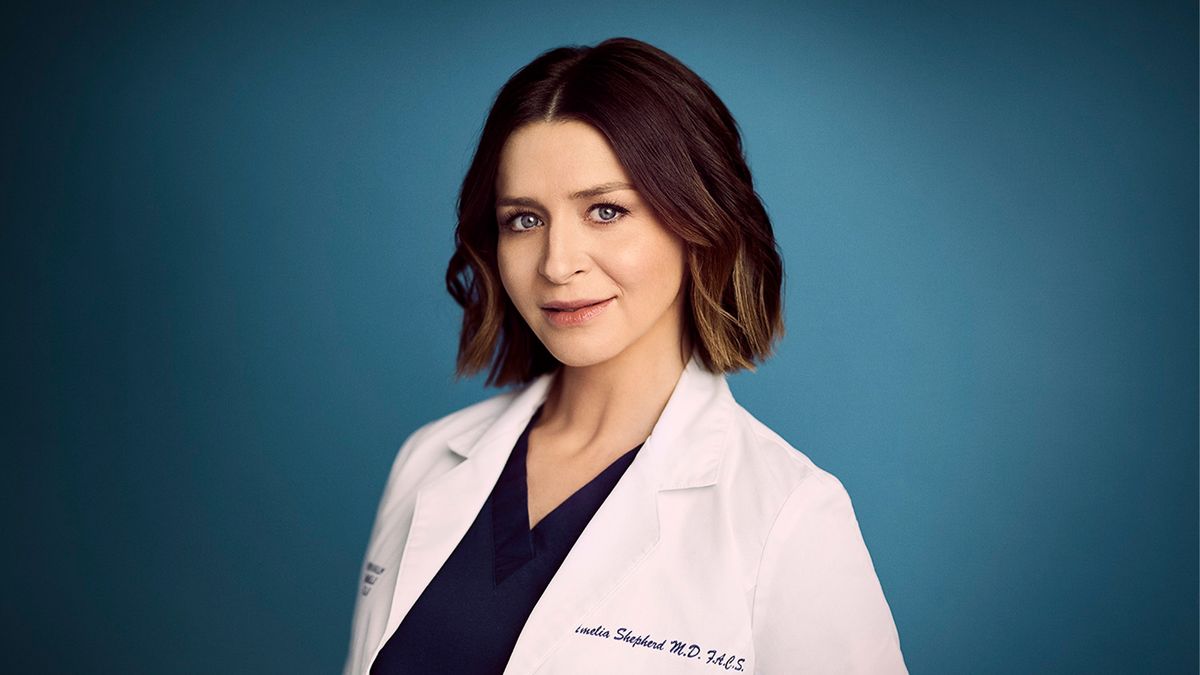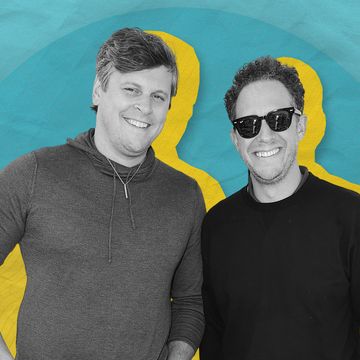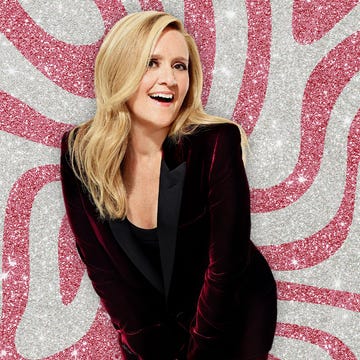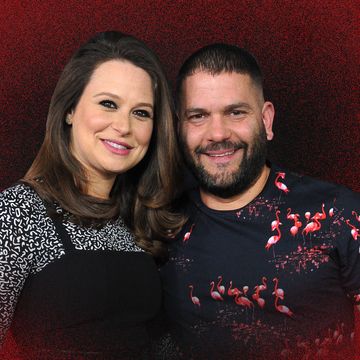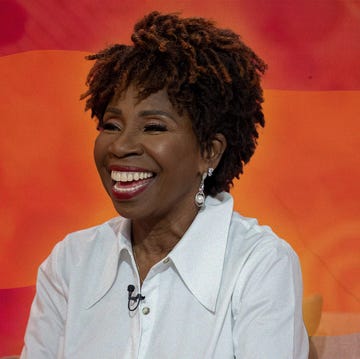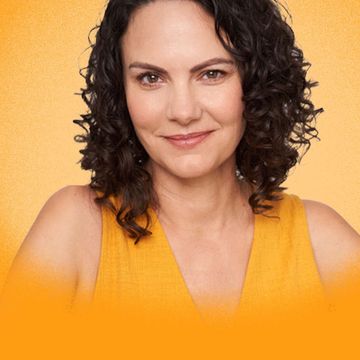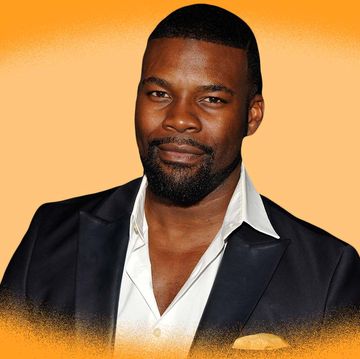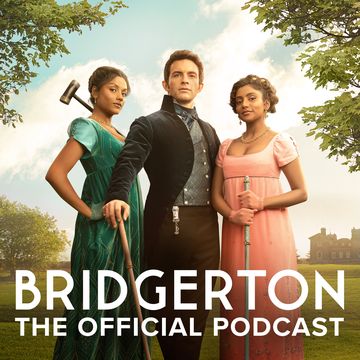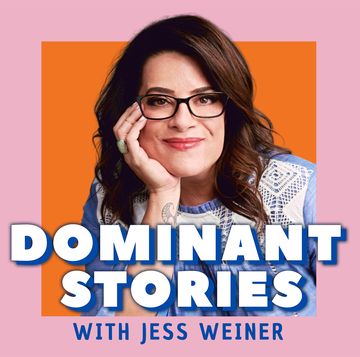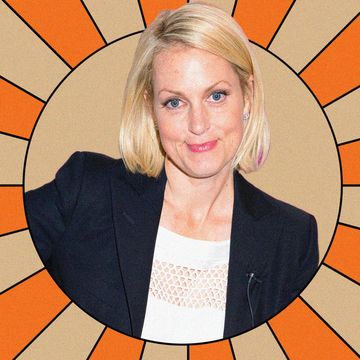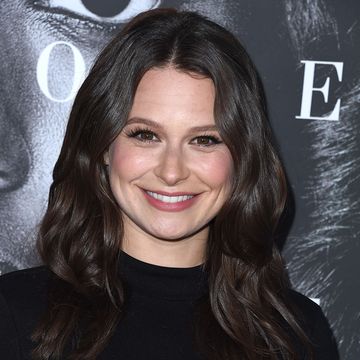On a recent episode of Shondaland Audio’s Katie’s Crib podcast, Katie Lowes kept asking her guest, longtime friend and Shondaland compatriot Caterina Scorsone, “When is your ‘Mommy and Me’ class going to start because I need to sign up!” We’re not sure that Scorsone has any plans to create or run such a parenting class, but Lowes was driving home a not-so-subtle point: That Scorsone, the mother of three girls and a full-time actor as Dr. Amelia Shepherd on Grey’s Anatomy, has a very unique, very Zen, but also very practical outlook on life. And who among us couldn’t use a little bit more of that — kids or no kids?
“It’s almost like approaching your whole life like you’re traveling,” Scorsone laughs via Zoom from her home in Los Angeles where her kitten, Luna, keeps coming into frame, obviously interested in our conversation. “You know your destination, and you know the route you want to take, but you’re also open to new perspectives because you don’t assume that you know everything about a place. Maybe a lot of it is pretty similar, but you’re still going to approach your cup of coffee on the patio with a slightly greater degree of curiosity and reverence and engage in the sensory experience a little more deeply because you haven’t closed off your mind to the possibility that you don’t already know what this is about.”
Indeed, Scorsone approaches everything she does with “radical curiosity,” a term she uses on the podcast. Her daughters — Eliza, 9; Pippa, 4; and Lucinda, 1 — are what fuel this constant inquisitiveness, especially her middle child, who was born with Down syndrome. Though it was scary for Scorsone at first, because she was unfamiliar with what raising a child with a disability would look like, Pippa has been a source of awakening for Scorsone, which she talks about on Katie’s Crib.
Listen to the podcast above — and be sure to subscribe to Katie’s Crib on Apple, iHeart, or wherever you get your favorite podcasts — to hear Lowes and Scorsone talk about home births, pathologizing pregnancy, and raising a daughter with a disability. And read on below where we keep the conversation going about narrative storytelling as a way to promote social justice, Scorsone’s trajectory into acting, and how she incorporates flow into her everyday life, including on the set of Grey’s.
VALENTINA VALENTINI: What skills have you found that cross over from being a mother to an actress or vice versa?
CATERINA SCORSONE: All of them! One of the amazing things about the career I’ve been able to have, and the journey with Shondaland, is this long-term relationship with Amelia. I’ve gotten to explore a human over time, and to stay engaged in that process, I think you have to develop a relationship with your character that’s based in a soft curiosity and empathy about how their body, their nervous system, their internal landscape is encountering their external environment and how that’s impacting them, how it’s changing them. And I think that that’s a very similar orientation to the kind of motherhood that I like to practice, where you encounter each of your children with this soft curiosity. Where you’re listening and watching and being present to their experience of their internal mechanisms with their external environment. It has to remain kind of mercurial, changeable as they develop over time. And you have to be present for each of those changes.
VV: Did you always want to be an actress?
CS: I never wanted to be an actress [laughs].
VV: Then how did you end up here?!
CS: I suppose it was a similar orientation of soft curiosity towards what the journey of my life is supposed to be. When I was growing up, I thought I wanted to be an obstetrician and neonatologist; I wanted to be a doctor. I came from this big family and my parents were academics but also into social justice. We didn’t have a lot of material wealth, and there was this expectation that you go to college, but there were few resources. [Laughs] We were in a choir, and someone there had an agent, and they were working as an actor, which is where I figured out that I could act and they would give me money for it! So, I started on the Canadian equivalent of Mr. Rogers Neighborhood, called Mr. Dressup. I just started doing it to make money for college. I always thought I would go into either medicine or social justice. When I was about 16 or 17, I was still acting to make money, and some of my actor friends expressed that they wanted to keep doing it, like, as adults. It had never occurred to me before that it was not an extracurricular activity. So, then I started getting a little more serious about it, and by the time I was about 19, I’d done some movies and some shows and had enough of a taste of the industry that I wanted to explore other things.
VV: And so you decided to go to school instead of continuing to act professionally?
CS: I was on a movie with Ed Harris, The Third Miracle, directed by Agnieszka Holland, and I started talking to him, wondering if I should just move to LA or if I should go to college. I had just been offered a scholarship to a college in Toronto. And Ed was like, ‘Go to university. The industry will always be here.’ And it was there in undergrad that I started to develop an appreciation for narrative storytelling as social justice work. I was studying philosophy, comparative religions, and literature.
VV: Explain that more — how narrative storytelling is a form of social justice.
CS: Yes, it’s important to feed people and to get roofs over everyone’s heads to fight for equity. But the core of the reason to do any and all of those things is because of each person’s sacredness. And one of the things that allows us to experience our sacredness is our ability to self-reflect through understanding our own personal narrative, the narrative of societies and communities and cultures around us, and how we are a part of those communities. I finally developed a greater appreciation for storytelling and acting philosophically, which allowed me to come back to it professionally.
VV: And, like you talked about on the podcast, you also studied midwifery.
CS: Yes, I was trained as a doula and began to train as a midwife but that’s a three or four year process, like med school. I was only at the beginning of that journey when I went back to acting. After going to Tennessee and studying with Ina May Gaskin, I moved to LA to apprentice for a midwife, and while I was doing that apprenticeship, I started booking gigs. I had one foot on each path and I couldn’t do both. I streamed towards acting again, and I’m happy I did. I love acting.
VV: And, hey, you sort of fulfilled that dream of working in medicine ... You play a doctor on TV!
CS: Have you heard the anecdote about Grey’s Anatomy?
VV: I have not. Do tell!
CS: In my last year of undergrad, I was studying for finals and also watching the first season of Grey’s Anatomy to unwind. I loved it so much that I went to the medical faculty, and I started a six-week course to see what would be involved in transitioning from arts and science to premed. When I got to the end of the lecture series, I concluded that, in fact, I did not want to be a doctor. I just wanted to be on Grey’s Anatomy.
VV: That is a great anecdote. And in that philosophical sense, you are fulfilling the other dream of pursuing social justice too, right?
CS: Yes. I think what we do on Grey’s Anatomy is very much involved in social justice. For people who might not have the relevant information, we are illuminating where there are disparities in equity and where we can improve. We are helping to educate in a lot of ways. And not only in kind of an informational way or a statistical way like you get through the news, but we are giving personal stakes to people so that they can develop their empathy for communities that they’re maybe not actively participating in. We’re seeing characters who maybe we wouldn’t have encountered in our day-to-day lives, who are fully fleshed out as living, breathing, loving, grieving human beings. And so, we connect with them in a way that feels real enough that we can start to reconsider worldviews and reconsider our vote and put our money where it’s needed. I think my job ends up being an active way to participate in social justice.
VV: And you’ve been doing more advocacy work with Pippa too?
CS: Yes. We’ve been showing people what a typical family with somebody who has a disability looks like and trying to reduce fear and stigma and increase visibility for the disability community and for the Down syndrome community.
VV: You’re so honest about sometimes not knowing the right way to talk about it, not having all the answers. Why was it an important thing to do, do you think?
CS: I think one of the big reasons a lot of people don’t get involved in advocacy is because they’re afraid of hurting people or of doing it wrong or not being perfect at it. Perfectionism that leads to procrastination, you know? One of the great takeaways of my experience so far has been to be okay with making mistakes and being corrected. I’ve learned it’s important to incorporate new information and not expect ourselves to have information before we have it. We’re a human family and we’re not going to be perfect all the time. Our intentions are as positive as they can be for any human and we’re just showing up and we’re available to learn.
VV: So the term “flow”— which you connect to as a way of living — is quite different from a “just go with the flow” mentality. Can you expand on that a bit more?
CS: It’s speaking to that question earlier — it’s about having a presence in your life that doesn’t assume a conclusion. Obviously, we need mental models so that we can function in the world. That’s how our human brain mechanisms work: we categorize, analyze, and come to conclusions that are going to allow us to be safe and be functional and navigate our environment. That is going to happen, and we have to be gentle with ourselves about having mental models because it’s how we operate. But, knowing that, simultaneously being able to hold a question mark, a curiosity for where this mental model we’re operating under the assumptions of, is a little bit looser than you think, so that you can encounter and incorporate new information.
But I also have a healthy regard for structure, for those mental models. We have a very structured life on the set of Grey’s Anatomy. We come at 5:45 am every day, and I know I’m going to the hair and makeup trailer, then I’m going back to my trailer, and then I wait to be brought to set, and then we do the blocking and then we go get changed, and then we come in and do rehearsal. It’s extremely rigorously structured. But within that elegant and intricate structure — knowing what the day looks like and knowing what the schedule of the week looks like and knowing who our character is and how the story arc goes — because you have the safety of those structures, you get to flow in the moment. You get to be extremely creative because you know that you’ve taken care of business.
VV: You said something interesting on the podcast that I want to get some clarification on — you said that there was no pretending anymore about being a supermom.
CS: That was in reference to the pandemic, about how it became pretty clear through social media and us mothers communicating with one another about the challenges of things like, how do you parent without school, how do you work without daycare or without friends and neighbors who can come over and participate. Like how do we do all this? There were Zoom meetings in your house where people could see the dishes piled up or just that everything is not all dialed in. There was kind of an unveiling of all of our vulnerability, all our challenges. I think that we all came together through that it bonded everyone in the parenting community.
VV: And does the genie go back in the bottle now that we’re (hopefully, almost) out of the pandemic?
CS: I mean, can it?
VV: I think the lid is off, yes, but people get busy and wrapped up in their lives, and they forget to be empathetic. But I’m more of a pessimist, maybe.
CS: I feel like, after all that, people have greater empathy. I hope we don’t unlearn what we’ve learned.
Valentina Valentini is a London-based entertainment, travel, and food writer and also a Senior Contributor for Shondaland. Elsewhere she has written for Vanity Fair, Vulture, Variety, Thrillist, Heated, and The Washington Post. Her personal essays can be read in the Los Angeles Times, Longreads, and her tangents and general complaints can be seen on Twitter at @ByValentinaV.
Get Shondaland directly in your inbox: SUBSCRIBE TODAY
